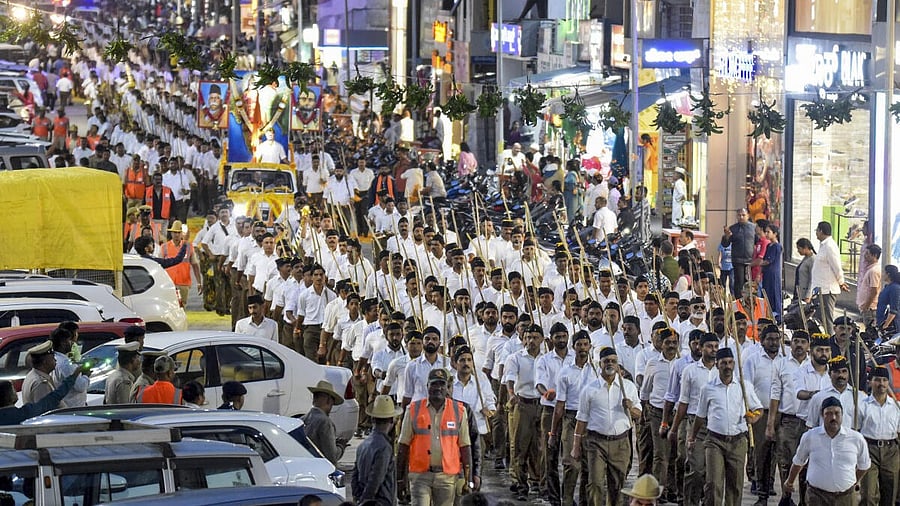
Rashtriya Swayamsevak Sangh volunteers participating in a march to mark the centenary of the organisation, in Chikkamagaluru, Karnataka.
Credit: PTI Photo
The Rashtriya Swayamsevak Sangh (RSS) is in focus in Karnataka as the government is considering a proposal to ban its activities on government premises. The organisation, which celebrated its centenary recently, has faced nationwide ban thrice.
Though there is no such ban on the RSS in the country, its activaties have been barred in temples managed by the Travancore Devaswom Board in Kerala.
Karnataka Chief Minister Siddaramaiah has assured Minister Priyank Kharge of taking “necessary action” after the latter sought ban on all activities of the Rashtriya Swamyamsevak Sangh (RSS) on government premises.
“An organisation named the RSS has been using government and aided schools and public government grounds for shakas, and, through sloganeering, has been developing thoughts in the minds of children and youths against the integrity of the country and the intentions of the Constitution... From the point of view of children, youths, public and social harmony, I request you to ban all activities of the RSS in the name of Sanghik or Baithak in government and aided schools, fields, parks, temples belonging to the Muzrai Department, places of the Archaeological Department and other government places,” the Minister said in the letter dated October 4.
Banned thrice nationwide
The RSS has been banned thrice nationwide since its inception: in 1948, 1975 and 1992, which were momentous points in India’s history.
The organisation was banned for the first time in 1948 after Mahatma Gandhi was assassinated by Nathuram Godse, a former RSS member. The then Home Minister Sardar Vallabhbhai Patel issued a government notification that the Hindu body was being barred "to root out the forces of hate and violence that are at work in our country and imperil the freedom of the nation and darken her fair name". Patel lifted the ban in 1949, with an informal condition that the Hindu outfit would not venture into electoral politics, although that detail has since been overcome.
In 1975, the RSS was outlawed again during Emergency imposed by Prime Minister Indira Gandhi. This ban was lifted in 1977.
The ban on the RSS was imposed for the third time in 1992 following the demolition of the Babri Masjid in Ayodhya. It was lifted in 1993 after a tribunal found no sufficient grounds to declare the RSS unlawful.
In July 2024, the Union government lifted a 58-year-old ban that prohibited government employees from participating in RSS activities.
The ban was imposed in 1966 by the Indira Gandhi government.
Several States, including Rajasthan, Haryana, Madhya Pradesh, and Chhattisgarh, had already removed their own restrictions on government employees associating with the RSS.
Activities barred in temples
In 2023, the Travancore Devaswom Board (TDB) in Kerala barred activities like RSS drills, mass drills, and arms training in the temples managed by the board, stating that temple premises are only for rituals and festivals.
The TDB issued circulars to enforce this, including a ban on activities from outfits with extreme ideologies, and directed that temple property should not be used for any other purpose. This ban is intended to maintain a peaceful atmosphere and prevent the use of temple property for divisive purposes, according to the TDB.
